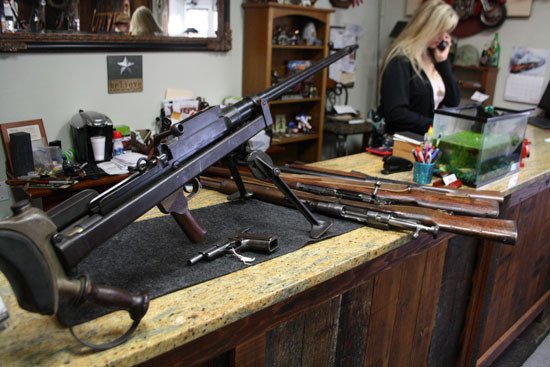When state Initiative 594 passed in November, Pioneer Museum in Lynden, Wash., found itself in a peculiar, and possibly lawfully ambiguous, position. According to the new law, the World War II firearms the museum has on loan from various owners for an exhibit would need to be returned to owners before Dec. 4, or the original owners of the weapons would need to undergo a background check before their weapons could be legally returned.
It was by chance that Pistol Annie’s Jewelry and Pawn shop in Bonney Lake learned about the museum’s problem, and decided to do something about it.
“My husband went home early, which he never does, and he caught the story on the news,” said owner Melissa Denny. “When I got home, my husband said hey, check this out.”
The pawn shop decided to help the museum keep its exhibit by performing background checks on museum curator Troy Luginbill and the original gun owners. This way, the museum can legally display the firearms it has on loan, and when the exhibit ends in May, the museum can legally return the guns to the original owners.
Originally, the museum was going to return all 11 firearms from the exhibit, both because of the gray area the initiative created around long-term gun loans and the cost of background checks.
The background checks would normally cost $40 per gun in both directions, resulting in an estimated bill of $880 for the museum, but Denny decided to waive the fee.
Since this new development some of the firearm owners told Luginbill they do not want to undergo a background check for their property to be returned. In fact, Luginbill is now the only firearm owner that will be displaying his weapons at the exhibit. Only five of the original collection of 11 firearms belong to Luginbill. The other six firearms will be returned to their owners before the law goes into effect.
Luginbill said this is unfortunate, because some of the other firearms are rare, including a M1941 Johnson automatic rifle, a M50 Reising submachine gun, and an M1 Garand rifle.
The firearms still on display include a Browning Hi-Power pistol, a Type 38 Arisaka bolt action rifle, and a .50 caliber anti-tank rifle. While the firearms are Luginbill’s property, the law requires he get a background check because the museum is a separate entity, even though Luginbill is the curator of the museum.
“It’s a funny aspect of the law,” he said.


